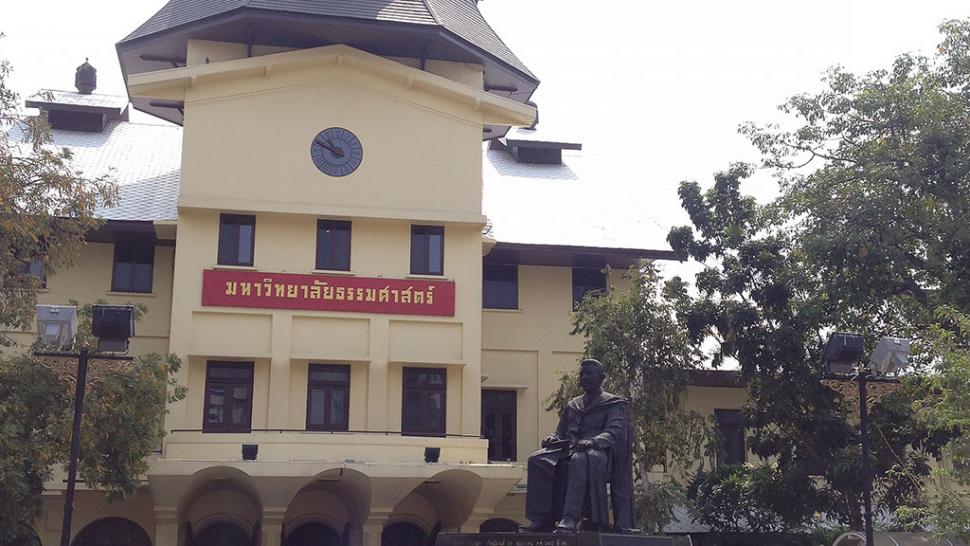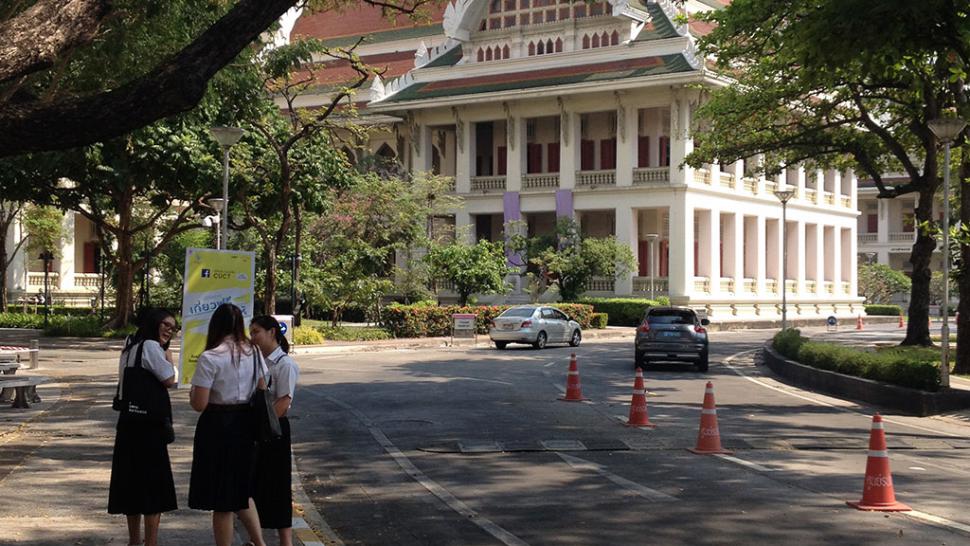
The campus and the king
Different as Bangkok’s two major universities may be, they do share one characteristic: both Chulalongkorn and Thammasat’s campuses have protest boiling just below the surface. Here, demonstrations do not target unfair university boards or academic hierarchy at the risk of missing a class as they do in Holland. Instead, students and teachers are objecting against an oppressive government, risking their freedom and possibly their lives.
Chulalongkorn is Thailand’s oldest university, named after the king who founded the institution in 1917 and who was a member of the prestigious Association of Pacific Rim Universities. It teaches the best of the best, and has an entranceway to match its status: even most Ivy League institutions would be hard pressed to match its venerable gates, the driveway leading up to elegant buildings and flanked by manicured lawns, and – striking to anyone but the Thai – several larger than life portraits of the reigning monarch. Solemn, paternal or smiling beatifically, King Bhumibol looks down upon visitors and students wherever they go.
In this, the campus isn’t much different from the rest of Bangkok. Apart from the masses of young tourists sporting fresh bamboo-tattoos and the thundering of dangerously speeding mopeds, the king is the most typical hallmark of the city’s streets and squares. Bhumibol Adulyadeh, officially Rama IX, is omnipresent; his visage gracing billboards and triumphal arches spanning every traffic artery. The campus is no exception, and yet the royal presence in an academic environment is all the more puzzling. It would be difficult to imagine the atmosphere at a Dutch university should Willem-Alexander’s blushing cheeks feature at every other corridor.
The Thai, however, simply love their monarchy. Most observers typify this as a colourful local eccentricity; the young Thai intelligentsia as a somewhat exaggerated expression of patriotism at worst. This spring’s Bike For Dad-campaign, for instance, in which thousands of Thai undertook bike rides to honour Bhumibol’s 88th birthday, causes a dreadlocked Thai youth to smile with slight embarrassment. ‘I love the king’, she hastens to stress, ‘but I’m not convinced all those posters and ceremonies were necessary.’ The true unease, as is often the case with the smiling Thai people, lies much deeper below the surface. The country has been governed for many decades by a series of military juntas, with one regime overthrowing the last. In the 1990s, a democratic future seemed to be within reach under the elected Thaksin government, but he, too, was ousted by a coup d’etat in 2006; the new constitution erased before its ink had dried. Although the PR-conscious generals at the helm of the tourist paradise have avoided major human-rights scandals in recent years, fear is widespread and freedom of speech nonexistent. The king is untouchable above all. Lese majeste is a serious crime and also the justifi cation the current junta, like those before, gives for its coup. The king thus legitimises the regime, and vice versa.
Elephant in the room
At the other end of the city, a stone’s throw from the ancient citadel’s most revered temples, lies Thammasat University. This is the other pearl in the nation’s academic crown, in eternal, if goodnatured competition with Chulalongkorn in sporting matches and Olympiads. In many ways it mirrors its rival: the small central campus is strewn with palatial, slightly more modern halls interspersed with pleasant lawns. But the elephant in the room quickly becomes very clear to any visitor: Bhumibol is nowhere to be seen.
Why are his portraits missing here, in the very heart of the capital, literally in the shadows of the royal palace? When asked, a student looks around in wonder. ‘They are? I haven’t paid much attention to it’, she says, adding: ‘We can respect the king without portraits I guess.’ She continues on her way to class, past a large statue in bronze on the quad. It’s an effigy of Pridi Banomyong, the socialist politician who ended absolute monarchy in Thailand in 1932 and went on to found Thammasat. Since its earliest years, the institution has been known as a bastion of critical thinking and contestation, even though Banomyong had to flee the country on several occasions after a failed attempt at farreaching socialist reforms.
(The article continues beneath the image)

‘When choosing which university I wanted to spend my exchange at, I first wanted to go to Chulalongkorn as it looked so good’, says the French Heloise (22). ‘but I changed my mind when I read about the activism at Thammasat. The university’s song is the Marseillaise – when I heard that my mouth fell open.’ When she arrived, she knew everything about its fascinating political fervour, yet saw almost nothing of it around campus. ‘Very frustrating for a political scientist!’ she laughs. Still, she knows her university is thought of as annoying to the government. ‘On a study trip to the city planning bureau, public servants felt attacked by even our most innocent questions on policy.’ Her teachers are involved, she feels, ‘but always very careful: everyone in class has a different conception of Thailand’s past. There is no stable conception of history.’
‘Our university has always been involved in politics’, says Mossy (21, journalism). While all students are aware of this, he continues, some are uneasy with it. Everyone knows the stories of the bloody student protests of the 1970s and their brutal end, and less than a year ago, fourteen students protesting at the (ironically) pompous Democracy Monument were arrested. ‘I think they did what they had to do’, Mossy says diplomatically. ‘I’m not political myself, but the protesting students just want the government that is best for the country.’
Democracy not found
The ‘Thai 14’ were released after numerous shows of solidarity by both students and teachers, but many activists at both Thammasat and Chulalongkorn are still being watched, and sometimes threatened, by the junta. Tensions came to a boiling point several weeks ago during the annual sporting match between the two universities. Traditionally, the two student bodies built floats featuring political caricatures and much double entendre, and paraded them around the field. They are notorious for their subtle, yet biting criticism of the regime: this year students were rolled around in cages, the everpromised constitution lamented. Yet every student was also frisked at the stadium entrance, and the building of the floats was monitored by the police. A cheeky internetspoof, with ‘404democracy not found’ printed on dozens of audience umbrellas, was prohibited by the military beforehand.
(The article continues beneath the image)

It was during these same games that Sirawith Seritiwat, one of Thammasat’s most politically critical students, was arrested – and not for the first time. Five masked soldiers dragged him into a truck, he reported after his release. ‘They put a cloth bag over my head and hit me. They asked me: “Do you want to be famous? Why did you talk to journalists?”’ A junta general reacted laconically to media, saying that Seriwat had simply been ‘called up for a warning to change his attitude’. This is a tactic the government uses often; summoning activists to police stations for intimidating speeches and threats under the euphemism ‘attitude adjustment’.
Attitude readjustment
It is illustrative of the increasing brutality the regime uses against academics and lawyers speaking up against the regime. ‘I know that some of my fellow students are involved in activism because they are constantly asked to show their documentation and carry identification’, says Heloise. Several professors of both Chulalongkorn and Thammasat have now fled to other institutes abroad. Chulalongkorn’s Pavin Chachavalpongpun, assistant professor in South-East Asian Studies, now teaches at Tokyo and Oxford. He described in an article how his family was informed by the military that they would face consequences if he did not come in for a session of ‘attitude readjustment’.
The style of suppression is starting to resemble the era of the red shirts (anti-elite) and yellow shirts (pro-monarchy), violently ended in the late 1990s. ‘Thammasat students were accused of being communists just because they protested against the government’, says Arm (23, international relations). ‘Several were even shot.’
A new generation will therefore have to go about the difficult matter of protesting with subtlety. This year, the government has promised new elections; votes are said to be bought up in great numbers already. On Chulalongkorn and Thammasat campuses, students hurry to their lectures – sensibly uniformed and often just hoping for good results that will lead them to a good career or a way out of the country – under the watchful eyes of the king and the revolutionary who defied him.
And the real Bhumibol? ‘He is supposed to be in a hospital right across from my student dorm’, Heloise says. ‘I often see royal limousines coming and going, but I’ve never seen the king himself.’ Rumours are buzzing that the monarch, who at 88 hasn’t made a public appearance in years, has actually passed away. Whispers abound that the junta is likely keeping the information tightly under wraps until after the Thai New Year in an attempt to bolster their prefabricated re-election. If this is the case, the world will soon find out – New Year celebrations have just ended.
But whether they succeed in muzzling the growing academic voice of dissent remains to be seen. The activist core is small, but their actions are increasingly clever and intensifying. ‘I don’t see much political activism among my fellow students these days’, says Arm. ‘But that might be deceptive, as much of it is now playing out on social media.’

